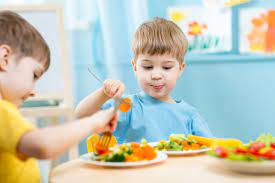Healthy Meals for Early Childhood : Detailed Guide 2023
Early feeding habits in children can influence their later eating habits. It is crucial to start introducing healthy meals for children. You can introduce infants to meals and beverages besides breast milk and baby formula when they are about six months old.
What Healthy Meal Should be First Introduced in Early Childhood?

When looking for a quick and healthy meal to introduce in your child’s early childhood, you should consider a dish that is packed with nutrients, delicious, and easy to prepare.
A great option would be a colorful salad with a variety of fresh vegetables and a lean protein source such as grilled chicken or tofu. This type of meal is not only nutritious but also provides a great opportunity to introduce your child to a variety of flavors and textures.
Additionally, a salad is a quick and easy meal to prepare, making it a perfect option for busy parents. By incorporating a variety of healthy foods into your child’s diet at an early age, you can set them up for a lifetime of healthy eating habits.You don’t need to introduce foods to most kids in a certain order.
Children can eat various meals from several food categories by the time they are 7 or 8 months old. To develop into a healthy and active adult, your child requires a variety of vitamins and minerals.
To make your child’s plate look like a rainbow, place meals in all various colors, for example, fruits like avocados, bananas, strawberries, pears, oranges, or melons. Vegetables like spinach, carrots, peas, sweet potatoes, or beets that have been cooked.
Whole grain pasta, crackers, and bread. Meats like tender, little bits of beef, lamb, chicken, fish, or turkey. Dairy products like cheeses or yogurts (pasteurized only).
Healthy Eating Isn’t Just About Food: Drinks, Also Matter

When looking for healthy meals for early childhood, it’s important to remember that drinks also matter. The beverages we choose to serve our children can be a significant source of added sugar and empty calories, so it’s essential to make it a priority to look at the drinks we are offering.
Water
One of the best drink choices to serve your child is water. Water is essential for hydration and is calorie-free, making it a healthy choice. Encouraging your child to drink water at meals and throughout the day can help them establish healthy habits early on.
Milk
Another great drink option is milk. Milk is a good source of calcium and vitamin D, which are important for strong bones and teeth. However, it’s essential to look at the type of milk you are serving your child. Whole milk may be appropriate for younger children, but as they grow older, it’s important to transition to lower-fat milk options.
Sugary Drinks
On the other hand, sugary drinks like soda and fruit juice should be limited or avoided altogether. These drinks are a significant source of added sugars and can contribute to weight gain and dental problems.
Fruit Juice

If your child is craving something sweet, try offering them a small serving of 100% fruit juice or making a smoothie with fresh fruit and yogurt.
Overall, when looking for overall health of your child, it’s important to look at the drinks they are consuming, as well as the food. Water and milk are great choices, while sugary drinks should be limited or avoided altogether.
By making small changes in your child’s drink choices, you can help them establish healthy habits that will last a lifetime.
Between the ages of 6 and 12 months, you can provide water (4 to 6 ounces per day), infant formula, or breast milk if you’re still breastfeeding, and you can also start giving fortified cow’s milk to your child once they turn one year old.
What to Avoid When Preparing a Quick and Healthy Meal for Your Child?
Avoid giving some foods and drinks to children under one year of age like:
- Children under the age of one year may develop botulism, a severe form of food poisoning.
-
Unpasteurized food or beverages:
These things could expose your child to E. coli, a dangerous bacteria that can cause debilitating diarrhea. Foods that are frequently unpasteurized include raw milk, juice, yogurt, and cheeses.
-
Fortified cow’s milk:
Infants younger than one year may get intestinal hemorrhage as a result.
-
Fruit juice and other sweetened beverages:
Before they turn 12 months old, children should not consume 100% juice or juice drinks with added sugars.
-
Processed Meals
When preparing a quick and healthy meal for your child, avoid meals that are packed with processed and artificial ingredients.
- Instead, opt for fresh and whole foods such as fruits, vegetables, and lean proteins like chicken or tofu.
-
High Sugar Foods
Avoid meals that are high in added sugars or sodium, as these can be harmful to your child’s health in the long run.
- If you are short on time, avoid meals that require a lot of preparation or cooking time.
- Instead, opt for simple and easy-to-make meals like salads or stir-fries, which can be made in a matter of minutes.
-
Saturated and Transfat Foods
Avoid meals that are high in saturated or trans fats, which can contribute to heart disease and other health problems.
- Choose meals that are rich in healthy fats like omega-3s, which are found in foods like salmon, nuts, and seeds.
-
Calory Loaded Meals
Avoid meals that are loaded with calories and offer little nutritional value. For example, avoid fast food meals, which are often high in calories, sodium, and unhealthy fats.
- Aim to prepare meals that offer a good balance of protein, carbohydrates, and healthy fats, as well as vitamins and minerals.
- Focus on fresh, whole foods that are packed with nutrients to ensure that your child is getting all the nutrients they need to grow and thrive.
Set a Good Example for Your Kids
- Children will start eating more of what you eat after one year old or older. Set a good example for your children by eating healthily.
- Limiting foods high in sodium and added sugars is crucial for kids and adults.
- Children can obtain the nutrients they require for healthy growth and development by eating a nutritious diet. Adults who follow a healthy diet are more likely to avoid developing obesity, type 2 diabetes, heart disease, and other significant and expensive chronic conditions.
- Fruits and vegetables, whole grains, lean proteins, and low-fat or fat-free dairy products are all abundant in a balanced diet.
- In the age of convenience foods and fast-paced lifestyles, it can be easy to fall into unhealthy eating habits. However, as a parent, it’s important to set a good example for your kids when it comes to food choices.
- If you want your children to eat a balanced and nutritious diet, you need to lead by example. Have a healthy dinner with your kids. Make a conscious effort to eat healthy foods in front of your children and avoid giving in to unhealthy cravings.
- To eat healthy, start by filling your plate with a variety of colorful fruits and vegetables. Try to incorporate a lean protein source with each meal, such as grilled chicken or fish. You can also experiment with different grains like quinoa, brown rice, or whole wheat pasta.
- On a busy day, if you don’t have time to prepare a full meal, opt for healthy snacks like fresh fruit, nuts, or a smoothie with a mix of fruits and vegetables.
- For the sake of your children, try to limit your intake of sugary drinks and processed foods. Instead, opt for water, unsweetened tea, or a glass of milk with your meals.
-
Finally
- Remember that healthy meals for early childhood is not just about the food you consume, but also about the habits you develop. Encourage your children to join you in cooking and preparing meals, and make family mealtime a priority.
- By setting a good example for your kids and making healthy eating a priority, you can help them develop lifelong habits that will benefit them in the long run.
To conclude, all mothers should pay extra attention to healthy meals for early childhood diet during the first years of their life as it is the source of nutrients and energy to help them have normal growth and development and sets healthy eating habits for the coming years after.








